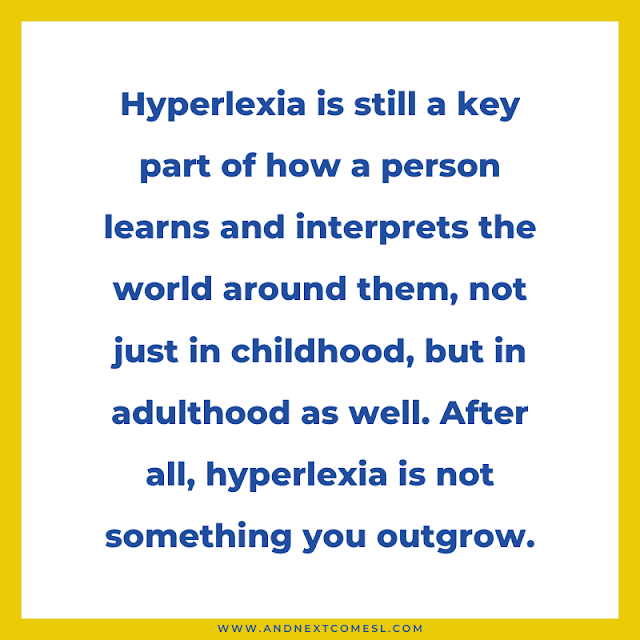While you can certainly find information about hyperlexia in children (I mean my whole website is dedicated to this particular topic), there's actually very little information about how hyperlexia presents in the teen years or in adulthood.
There's basically zero research on the topic either. Not surprising, though, given how little research there is on hyperlexia in children in general.
Yet, hyperlexic children do grow up. They become hyperlexic teens and, eventually, hyperlexic adults. So where's the support, resources, and information for them?
Similar to how there are lots of late-identified autistics out there, there are quite a few late-identified hyperlexic adults out there as well.
Perhaps you are one of those adults who just discovered the term hyperlexia and are wondering if you are hyperlexic or not. (Psst...there is a new tool coming your way soon to help with this discovery phase!)
Or maybe you're just wondering what hyperlexia looks like as an adult because you're curious what the future might hold for your hyperlexic child.
Well, let's take a closer look at what hyperlexia in adults looks like.
A Few Important Points to Keep in Mind About Hyperlexic Adults
Before reading through the list of hyperlexic adult traits, it's important to remember that the following must have been present as a child in order to be considered hyperlexic as an adult:
- Early self-taught ability to read: You learned to read early and without formal instruction before the age of five
- Language differences: Difficulty understanding and developing oral language, difficulty with WH questions, echolalic, comprehension challenges, literal thinking, gestalt processing
- Social differences: Difficulty with social situations, intense focus on specific interests, preference for routine, repetitive behaviors, preference for solitary or scripted play
If the above traits were not present, then you're likely not hyperlexic. Especially if the early self-taught reading piece is not present.
It's also important to note that "the presence of an accompanying neurodevelopmental disorder" (Ostrolenk et al., 2017) is a key component of hyperlexia. For example, that might mean being identified as autistic or diagnosed with some other neurodivergence (e.g., dyspraxia or ADHD) and/or a language disorder.
So What Does Hyperlexia Look Like in Adults?
Here are some traits of hyperlexia in adulthood that were shared by hyperlexic adults in our Instagram community (huge thanks to all who contributed!). You might notice that a lot of these traits are also present in childhood. They just simply continue on into adulthood as well.
- Auditory processing issues (read: hyperlexia and auditory processing and the power of waiting)
- Fast reading speed
- Anxiety around reading (usually due to underlying comprehension issues - see point #3 here)
- Intense interests in specific topics (i.e., special interests)
- Strong pattern recognition skills
- Interest in word games such as anagrams
- May have perfect pitch
- Concerned with pronouncing words correctly or having to relearn correct pronunciation (only because you've only seen them spelled out or read them elsewhere and have never heard them pronounced before)
- Sensory sensitivities
- Drawn more to informational or non-fiction texts rather than fiction
- Self-stimulatory behaviors aka stims (e.g., air writing can still be common among hyperlexic adults, but may be more discreet)
- Preference for written communication over spoken
- Preference for learning through written material rather than auditory or visual methods
- Executive functioning challenges
- Difficulties understanding and picking up social cues
- Difficulties with comprehension, especially complex written material or anything that uses abstract thinking or figurative language
- Literal thinking
- Preference for social situations that have clear scripts, predictable structure, and/or established conversational patterns
- Occasional use of echolalia or even palilalia (repeating one's own speech), especially in new or unfamiliar situations
- Occasionally experiences situational mutism
- Wide range of reading habits: lack of interest in reading entirely (i.e., rarely reads for fun), reading a lot of books (but mostly non-fiction texts versus novels/fiction), repetitive reading behaviors/habits (e.g., reading the same books over and over), re-reading texts without a clear reason
- Difficulties expressing thoughts and feelings verbally
- Notices and points out spelling or grammatical mistakes (it can even feel like a personal attack on some hyperlexic adults)
- Engaging in masking behaviors
Now obviously, this list is not exhaustive and there will be some variability among hyperlexic adults in terms of traits and experiences. However, this list is meant to give you an idea of how hyperlexia can still impact day-to-day life in adulthood.
Hyperlexia in Adults: A Quick Recap
Unsurprisingly, a lot of the strengths, preferences, and traits of hyperlexic children remain present into adulthood. For instance, the preference for and reliance on written communication, strong pattern recognition skills, and the strong decoding skills continue to be important for hyperlexic adults. There's a reason why hyperlexia is often referred to as a learning style...
So, it's important to continue to lean into these strengths to support hyperlexic adults, as needed.
Some hyperlexic adults may need relatively little support, whereas others may require more support. Many might be really good at masking their challenges too.
The point here is that there will be a wide variety of support needs for hyperlexic adults. And you can see that hyperlexia is still a key part of how a person learns and interprets the world around them, not just in childhood, but in adulthood as well. After all, hyperlexia is not something you outgrow.
So...that's a peek at what hyperlexia in adults can look like.









